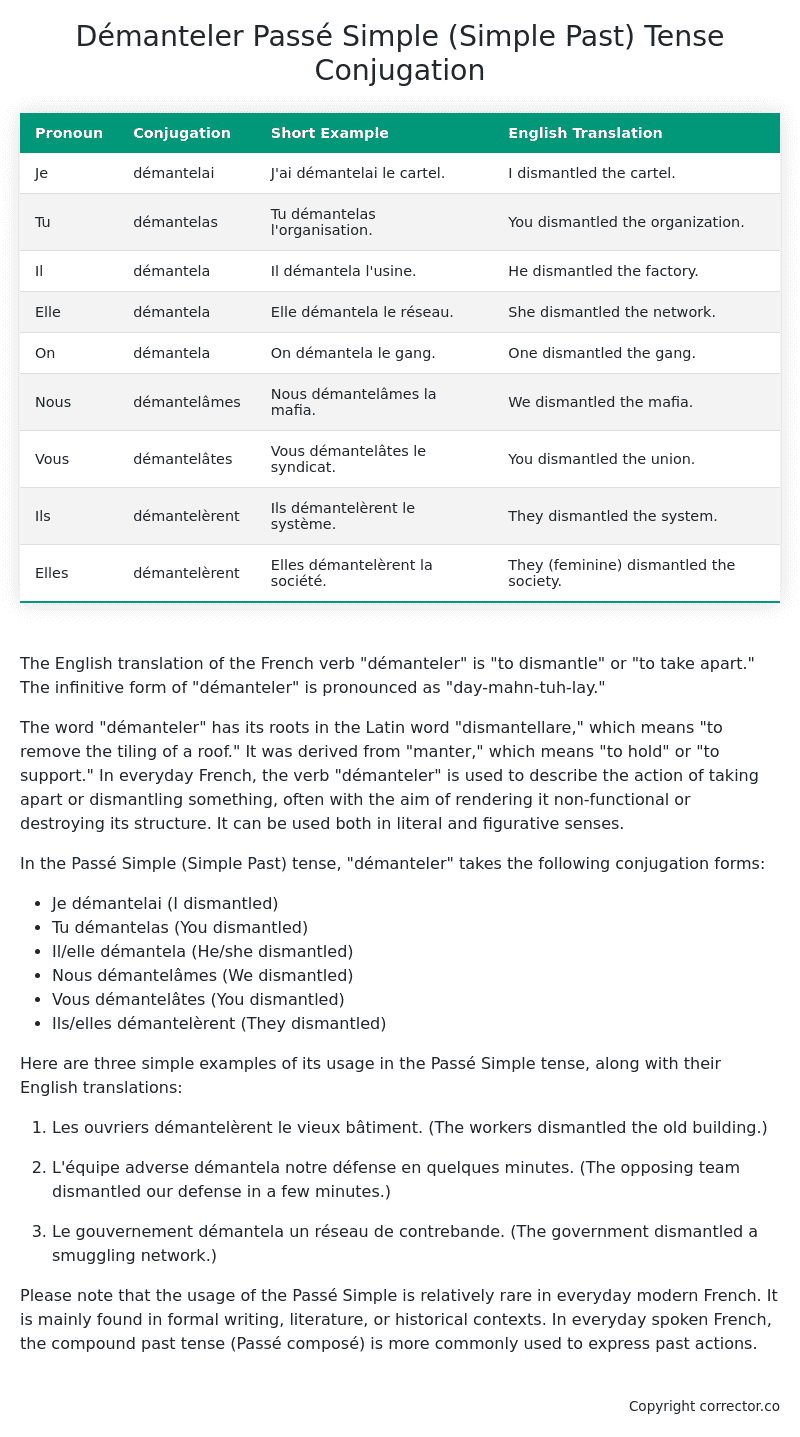Passé Simple (Simple Past) Tense Conjugation of the French Verb démanteler
Introduction to the verb démanteler
The English translation of the French verb “démanteler” is “to dismantle” or “to take apart.” The infinitive form of “démanteler” is pronounced as “day-mahn-tuh-lay.”
The word “démanteler” has its roots in the Latin word “dismantellare,” which means “to remove the tiling of a roof.” It was derived from “manter,” which means “to hold” or “to support.” In everyday French, the verb “démanteler” is used to describe the action of taking apart or dismantling something, often with the aim of rendering it non-functional or destroying its structure. It can be used both in literal and figurative senses.
In the Passé Simple (Simple Past) tense, “démanteler” takes the following conjugation forms:
- Je démantelai (I dismantled)
- Tu démantelas (You dismantled)
- Il/elle démantela (He/she dismantled)
- Nous démantelâmes (We dismantled)
- Vous démantelâtes (You dismantled)
- Ils/elles démantelèrent (They dismantled)
Here are three simple examples of its usage in the Passé Simple tense, along with their English translations:
-
Les ouvriers démantelèrent le vieux bâtiment.
(The workers dismantled the old building.) -
L’équipe adverse démantela notre défense en quelques minutes.
(The opposing team dismantled our defense in a few minutes.) -
Le gouvernement démantela un réseau de contrebande.
(The government dismantled a smuggling network.)
Please note that the usage of the Passé Simple is relatively rare in everyday modern French. It is mainly found in formal writing, literature, or historical contexts. In everyday spoken French, the compound past tense (Passé composé) is more commonly used to express past actions.
Table of the Passé Simple (Simple Past) Tense Conjugation of démanteler
| Pronoun | Conjugation | Short Example | English Translation |
|---|---|---|---|
| Je | démantelai | J’ai démantelai le cartel. | I dismantled the cartel. |
| Tu | démantelas | Tu démantelas l’organisation. | You dismantled the organization. |
| Il | démantela | Il démantela l’usine. | He dismantled the factory. |
| Elle | démantela | Elle démantela le réseau. | She dismantled the network. |
| On | démantela | On démantela le gang. | One dismantled the gang. |
| Nous | démantelâmes | Nous démantelâmes la mafia. | We dismantled the mafia. |
| Vous | démantelâtes | Vous démantelâtes le syndicat. | You dismantled the union. |
| Ils | démantelèrent | Ils démantelèrent le système. | They dismantled the system. |
| Elles | démantelèrent | Elles démantelèrent la société. | They (feminine) dismantled the society. |
Other Conjugations for Démanteler.
Le Present (Present Tense) Conjugation of the French Verb démanteler
Imparfait (Imperfect) Tense Conjugation of the French Verb démanteler
Passé Simple (Simple Past) Tense Conjugation of the French Verb démanteler (You’re reading it right now!)
Passé Composé (Present Perfect) Tense Conjugation of the French Verb démanteler
Futur Simple (Simple Future) Tense Conjugation of the French Verb démanteler
Futur Proche (Near Future) Tense Conjugation of the French Verb démanteler
Plus-que-parfait (Pluperfect) Tense Conjugation of the French Verb démanteler
Passé Antérieur (Past Anterior) Tense Conjugation of the French Verb démanteler
Futur Antérieur (Future Anterior) Tense Conjugation of the French Verb démanteler
Subjonctif Présent (Subjunctive Present) Tense Conjugation of the French Verb démanteler
Subjonctif Passé (Subjunctive Past) Tense Conjugation of the French Verb démanteler
Subjonctif Imparfait (Subjunctive Imperfect) Tense Conjugation of the French Verb démanteler
Subjonctif Plus-que-parfait (Subjunctive Pluperfect) Tense Conjugation of the French Verb démanteler
Conditionnel Présent (Conditional Present) Tense Conjugation of the French Verb démanteler
Conditionnel Passé (Conditional Past) Tense Conjugation of the French Verb démanteler
Conditionnel Passé II (Conditional Past II) Tense Conjugation of the French Verb démanteler
L’impératif Présent (Imperative Present) Tense Conjugation of the French Verb démanteler
L’impératif Passé (Imperative Past) Tense Conjugation of the French Verb démanteler
L’infinitif Présent (Infinitive Present) Tense Conjugation of the French Verb démanteler
L’infinitif Passé (Infinitive Past) Tense Conjugation of the French Verb démanteler
Le Participe Présent (Present Participle) Tense Conjugation of the French Verb démanteler
Le Participe Passé (Past Participle) Tense Conjugation of the French Verb démanteler
Struggling with French verbs or the language in general? Why not use our free French Grammar Checker – no registration required!
Get a FREE Download Study Sheet of this Conjugation 🔥
Simply right click the image below, click “save image” and get your free reference for the démanteler Passé Simple tense conjugation!

Démanteler – About the French Passé Simple (Simple Past) Tense
Formation
Usage
Narration
Historical Context
Interactions with other tenses
Passé Composé
Imparfait
Conditional and Subjunctive
Summary
I hope you enjoyed this article on the verb démanteler. Still in a learning mood? Check out another TOTALLY random French verb conjugation!


